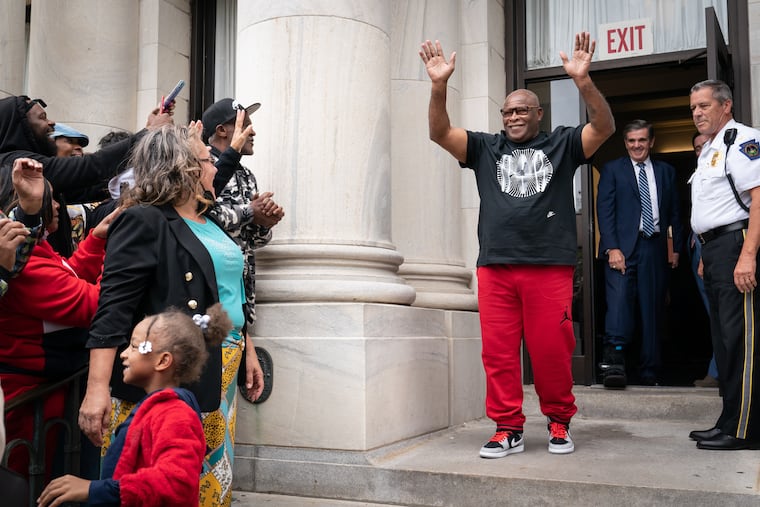After four decades in prison for a murder he says he didn’t commit, a Chester man is free
Leroy Evans' first-degree murder conviction in the death of Emily Leo was overturned Friday. Prosecutors said a key witness who testified against him in 1980 proved to be unreliable.

The first thing Leroy Evans did Friday when he stepped out of the Delaware County Courthouse and into his first day as a free man was hug his wife, Rosemary Simmons.
“It’s a blessing, just a blessing to see everyone,” a beaming Evans said. “When something like this happens, you have to thank God.”
Evans, 64, spent four decades fighting for his release, insisting he had been wrongfully convicted of a murder in Chester. Hours before he made those comments on the courthouse steps, prosecutors from the state Attorney General’s Office gave him a second chance.
During a hearing before Delaware County Court Judge Kevin Kelly, Evans’ first-degree murder conviction in the 1980 death of Emily Leo was overturned because a key witness recanted testimony implicating Evans. Evans then entered a no-contest plea to third-degree murder, was credited the 41 years he had already served, and sent into the care of his awaiting family.
Evans’ attorney, Mike Malloy, said the seven years working to win his freedom “were a gift” and that he had never met a man who had maintained his humility and gratitude while dealing with such adversity.
» READ MORE: From 2017: "Family rallies for Chester man imprisoned 37 years for murder he says he did not commit"
“When I met him, the case just didn’t fit,” Malloy said. “I read the trial testimony, and it was clear so many things went wrong, and not little things either.”
Leo, 47, was well known in Chester as an Avon saleswoman, and could frequently be seen carting the cosmetic products door-to-door. Richard Jones, Evans’ codefendant, lured Leo to his home on West 11th Street in November 1980 under the guise of making a purchase.
While at the house, Leo was strangled with a cord and beaten over the head, prosecutors said. She was stuffed into a garbage can and dragged into a field behind the home, where a passing trucker saw Jones throwing rocks at the prone Leo’s head.
Leo died two weeks later at Crozer-Chester Medical Center, where medics had taken her from the scene of the assault.
During a trial the following spring in Media, Jones was the prosecution’s star witness and confessed to luring Leo to his home and throwing rocks at her body. But he said Evans planned the attack and had strangled her after she arrived.
Evans maintained his innocence, saying all he had done was steal, and later burn, Jones’ bloodstained sneakers. Still, the jury convicted him and sentenced him to life in prison after just two hours of deliberation, sparing him from execution. Jones, for his role, pleaded guilty to murder and is also serving a life sentence.
But nearly 40 years later, in a 70-page sworn statement taken by Malloy in July 2016, Jones recanted the testimony that had doomed Evans. For the first time, he admitted to acting alone in Leo’s death.
Jones told Malloy that he had seen Leo the night before the murder at his girlfriend’s house, selling products. He decided to lure her to his home, he told Malloy, because he saw that Leo carried cash when she was selling the products.
Jones said he never included Evans, who lived across from him, in his plan to kill Leo. When Jones was later arrested, investigating officers told him he was facing the death penalty for murder. And when he learned that Evans had also been arrested in connection with the crime, he changed his story.
“The detectives kept telling me prior that ‘You couldn’t have did all this by yourself’…” Jones told Malloy, according to his statement. “And so when [Evans] had got locked up, and I knew that he had got locked up, I just incorporated him to stay away from the death penalty.”
During Friday’s hearing, Senior Deputy Attorney General Kelly Sekula said her office’s conviction integrity unit began a review of the case in 2020. Their investigation revealed that Evans’ original conviction was built almost exclusively on the word of Jones, who over the years had provided “multiple, inconsistent versions of events.”
Sekula said the office had decided that if the case were to be tried again, without the testimony of Jones, there would be “insufficient evidence to independently support a first-degree murder conviction” against Evans.
There was, however, enough to convict him of third-degree murder, as well as robbery, burglary, conspiracy, and related offenses, the prosecutor said. Evans accepted the offer, and entered a guilty plea.
One of Leo’s few surviving relatives, John Kaisner, attended the hearing Friday as his family’s representative.
Kaisner, who is married to Leo’s niece, Theresa, said the “horrendous assault” had robbed his family of Emily, a “small, delicate woman with a great smile.” She sold Avon, he said, to support her husband, who had been wheelchair-bound with multiple sclerosis.
He said his family was unhappy with the decision to revisit the case.
“We just knew over the last couple of years, and this has been going on a long time, that this was going to be the end result,” Kaisner told Judge Kelly. “We kind of got ourselves to the point where we accepted that.”
As one family lamented the outcome of the case, another prepared a celebration four decades in the making.
Simmons, Evans’ wife, said the family’s first stop after the courthouse would be a nearby cemetery, where Evans could pay respects to his mother and other relatives who died during his incarceration.
“It’s been a lot of ups and downs, but I had to stay strong, for him,” Simmons said. “We had to show him we were here for him, and we’re here to make the rest of his life as easy as possible.”